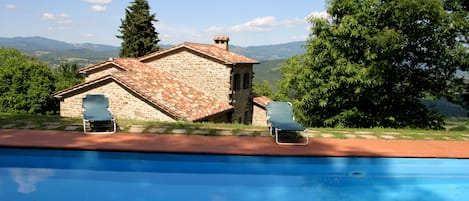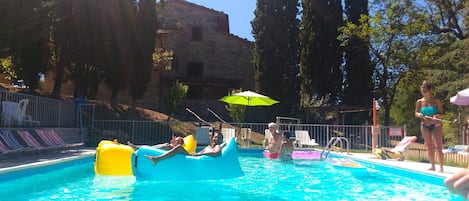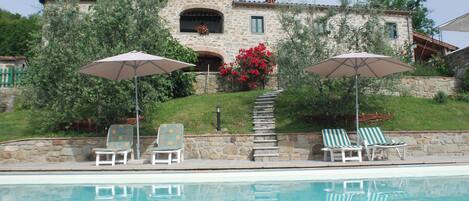Hele ferieboligen·Privat vert
Oasi del lupo ".La Villa ARTE del Lupo" Jewel in Tuscany near Arezzo
Bildegalleri av Oasi del lupo ".La Villa ARTE del Lupo" Jewel in Tuscany near Arezzo

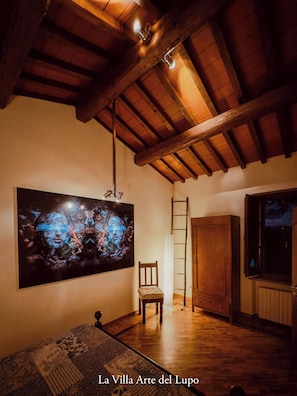
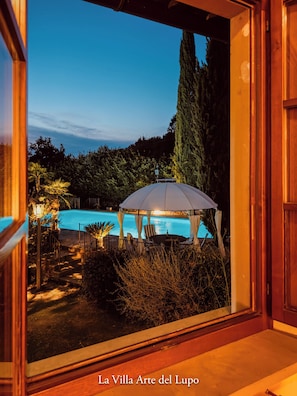
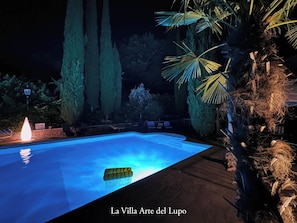
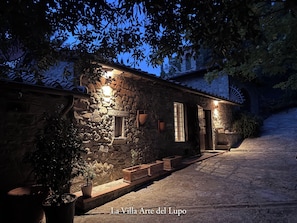
Anmeldelser
10 av 10 –
Suverent
2 soverom1 badPlass til 8 personer
Populære fasiliteter
Utforsk området
Subbiano, Arezzo
- Castelnuovo di Subbiano14 min kjøring
- Piazza Grande26 min kjøring
- La Verna-helligdommen40 min kjøring
Rom og senger
2 soverom (plass til 8 personer)
Soverom 1
1 dobbeltseng
Soverom 2
1 dobbeltseng
1 bad
Bad 1
Såpe · Håndklær tilgjengelig · Toalett · Kun dusj · Hårføner
Andre områder
Flatt tak eller terrasse
Kjøkken
Tekjøkken
Hage
Spiseområde
Om dette overnattingsstedet
Oasi del lupo ".La Villa ARTE del Lupo" Jewel in Tuscany near Arezzo
Welcome to our hidden gem in Tuscany! Our beautiful retreat offers the perfect combination of art and relaxation under one roof. Come and relax in our peaceful oasis and unwind.
The villa has four cuddly golden retrievers whose gentle nature will make you forget everyday life. 4000 sqm garden with pool in a fantastic panoramic location. The pool house is on the grounds of "La Villa ARTE del Lupo"
Subbiano is in the middle of the most important sights and is therefore perfect for day trips to many famous cities, such as Florence, Siena, Pisa, Volterra, Montepulciano, Perugia,
Lake Trasimeno, Castiglione del Lago, Citta di Castello. Drive to the famous Val di Chiana. Visit La Villa with its delicacies. All of these dream destinations can be reached in between 15 minutes and 1.5 hours.
Anyone who has a dream should go to Italy.
It doesn't matter if you think the dream is dead and buried,
in Italy it will rise again and come true
(Elizabeth Spencer)
The Villa del ARTE del Lupo – Not just a place to stay…
FROM WAYNE ANTHONY-08-2024
Nestled atop the rolling hills of Tuscany, the Villa del ARTE del Lupo offers not only a relaxing place to
stay, but a place where history, art, and mysticism converge in a glimpse of Italy’s historic past. The
property has served various purposes over its long life: a rest stop for travelers, a religious retreat, an
extensive family home, and now a place for guests to experience the beauty of Tuscany. While enjoying
a relaxing stay, however, guests should make time to explore the unique grounds, which, with open
eyes, give the keen observer a chance to explore a slice of the unique two-thousand year history of the
Italian countryside.
For the curious, consider a simple stroll around the property. Terraces carefully cut into the land provide
level areas for agriculture. Massive fig trees and orchards once offered fruit in their season. Cisterns,
now dry, attest to hidden Roman engineering. Traces of ancient lanes lead to hidden groves, pavilions,
and bowers, lost to the mysteries of time.
In fact, the approach to the Villa is one of the primary roads of ancient Rome, the Via Romea Germanica.
Around 1236 AD, this way transformed into a religious pilgrimage route linking Stade, Germany in the
north to the Vatican at Rome in the south. This historic road passes directly in front of the main Villa,
bisecting the land. Today, it is marked with two historical markers citing the mileage to either terminus.
Approaching the Villa from the south on this road and traveling up the hill, the land is lined with several
vineyards, fruit groves, and farms which originally provided food for the estate above. Aging
outbuildings still remain gently slipping away, a testament to effects of time. Small access lanes, now
wildly overgrown, wind away and lead to places long forgotten. As the house nears, on the left a storage
area, erected by a former owner, boasts stacked remains of historic stone work rescued from the
surrounding countryside. Upon arrival at the Villa, four unique markers clearly delineate the beginning
of the main compound.
The first of these sits to the right of the road, a large, arch-shaped stone. Protruding from its flat face, a
carved relief of an unknown pagan deity stands sentinel. Its features have been brutally defaced,
possibly in the Middle Ages, when the site was transformed from a pagan wayside to a Christian
nunnery, but its placement is clear. Even the early Romans sought the gods’ protection of their land.
On the left, across from the stone marker, sits the corner wall of the main entrance. Herein is set a
definitive reminder of the Christian conversion. An icon of Michael the Archangel defeating the Dragon
of Evil (Revelation 12:7 in the Bible), proclaims a notice of divine protection--no evil dare enter this
sacred site. In his hands, Michael wields a sword of victory and holds the scales of justice weighing the
hearts of all. His foot crushes the head of the defeated dragon.
Before the shrine is placed a kneeling plinth for prayer. To the right, a candle nook offers light to the way
of the pilgrims. Within the nook is the seal of the Grand Master of the Knight’s Templar, showing their
approval and use of the land as a safe haven for pilgrims. A Templer Knight with shield rides his steed;
circling is the Templar motto: Cristi sigillum militum (Seal of the Soldiers of Christ). Above, inscribed in
the plaster work, are the words “Io credo” (I believe). To the right of this sits an ambiguous symbol--a
circle with four petals, possibly a Greek Chi (the symbol of Christ) or a marker of the four Gospels
(Matthew, Mark, Luke, and John).
Continuing down the wall to the left of the icon, is another pair of markers. First, a half circle niche
which most likely held a statue of a local pagan god, is now bricked over. Then, a fresco triumvirate of
three women bathing naked in a spring, possibly water nymphs, is beside. In the far background of the
fresco, a depiction of the Villa can be seen. This enigmatic artwork stands in direct opposition to its
Christian neighbors--that is until entering the property through the passage just beside. Behind, not fifty
feet from the image is a well, a sacred spring. The fresco is a beacon for travelers on the road that there
is water for the thirsty weary available. This wellspring is likely an outlet of another amazing feature of
this property: through a variety of hidden underground waterways, the entire complex is feed water
directly from a hidden lake further up the hill
Finally, moving another twenty feet further down the entrance wall, is a final historical feature. Built
into the wall are the durchreiche, or ‘pass throughs.’ These two large, brick-lined circular openings date
from the time the property housed a cloistered nunnery. They allowed the surrounding community to
bring supplies to the Order, and pass these through to those cloistered and secluded within.
From this point, returning the Via Romane, the property unfolds. A tall stone wall lines the road to the
right. This creates a terrace on the hill above upon which sets the various buildings of the main property.
This wall opens to a car park beyond which and below lies a terraced planting area which most likely
served as kitchen garden for the medieval nunnery. Above this terrace, across the Roman road, is an
area which formed a meditation garden (not accessible as a part of the current property).
The rest of the complex consists of a sprawling number of buildings which have been adapted and
adorned by the work of the last previous owner. The grounds sport stoneware salvaged from the
surrounding countryside. Animals, water basins, and reclaimed building materials are artistically
incorporated everywhere and are worth a careful examination. Cast a glance upward as well, as the
stonework is even incorporate into the chimneys and roof features.
Finally, the four corners of main house’s eave are adorned with metal lilies, the symbol of
Easter—resurrection, hope, rebirth and blessing. This seems a curious addition until entering the
house’s kitchen. Just inside, a nook houses a painted icon of Mary holding Jesus. She keeps watch over
all who enter, and in his hands, the Christ Child holds a sprig of lilies, clearly the symbol of His blessing
and favor upon the house and all who enter.
Host:
Tammy and Ulli
About us
"Having fun in life is the best cosmetic for a woman."
Tammy a strong, beautiful woman at Ulli's side
Press release ULRICH HM WOLF:
Paris Hilton, Londonbeat, Natascha Wright (La Bouche) Thomas Anders, Weathergirls, Markus, Marjike Amado, Udo Jürgens and many others have been in front of the camera in his model villa in Taunusstein/Hessen and now Subbiano in Tuscany - that's where he likes to work most after his many travels. "The special, slow-paced, concentrated atmosphere in my refuge is often the basis for the extraordinary moment that needs to be shown," emphasizes photo psychologist and people expert Ulrich HM Wolf, who is unusually reserved for the media environment. A big city is not an option for his home base. After arriving from Berlin, London, NY, Milan, etc., it quickly becomes clear to everyone who comes for the first time: the warm atmosphere is unique and visible.?
The latest creation is called FACES - unique art portraits of predominantly famous faces.
The villa has four cuddly golden retrievers whose gentle nature will make you forget everyday life. 4000 sqm garden with pool in a fantastic panoramic location. The pool house is on the grounds of "La Villa ARTE del Lupo"
Subbiano is in the middle of the most important sights and is therefore perfect for day trips to many famous cities, such as Florence, Siena, Pisa, Volterra, Montepulciano, Perugia,
Lake Trasimeno, Castiglione del Lago, Citta di Castello. Drive to the famous Val di Chiana. Visit La Villa with its delicacies. All of these dream destinations can be reached in between 15 minutes and 1.5 hours.
Anyone who has a dream should go to Italy.
It doesn't matter if you think the dream is dead and buried,
in Italy it will rise again and come true
(Elizabeth Spencer)
The Villa del ARTE del Lupo – Not just a place to stay…
FROM WAYNE ANTHONY-08-2024
Nestled atop the rolling hills of Tuscany, the Villa del ARTE del Lupo offers not only a relaxing place to
stay, but a place where history, art, and mysticism converge in a glimpse of Italy’s historic past. The
property has served various purposes over its long life: a rest stop for travelers, a religious retreat, an
extensive family home, and now a place for guests to experience the beauty of Tuscany. While enjoying
a relaxing stay, however, guests should make time to explore the unique grounds, which, with open
eyes, give the keen observer a chance to explore a slice of the unique two-thousand year history of the
Italian countryside.
For the curious, consider a simple stroll around the property. Terraces carefully cut into the land provide
level areas for agriculture. Massive fig trees and orchards once offered fruit in their season. Cisterns,
now dry, attest to hidden Roman engineering. Traces of ancient lanes lead to hidden groves, pavilions,
and bowers, lost to the mysteries of time.
In fact, the approach to the Villa is one of the primary roads of ancient Rome, the Via Romea Germanica.
Around 1236 AD, this way transformed into a religious pilgrimage route linking Stade, Germany in the
north to the Vatican at Rome in the south. This historic road passes directly in front of the main Villa,
bisecting the land. Today, it is marked with two historical markers citing the mileage to either terminus.
Approaching the Villa from the south on this road and traveling up the hill, the land is lined with several
vineyards, fruit groves, and farms which originally provided food for the estate above. Aging
outbuildings still remain gently slipping away, a testament to effects of time. Small access lanes, now
wildly overgrown, wind away and lead to places long forgotten. As the house nears, on the left a storage
area, erected by a former owner, boasts stacked remains of historic stone work rescued from the
surrounding countryside. Upon arrival at the Villa, four unique markers clearly delineate the beginning
of the main compound.
The first of these sits to the right of the road, a large, arch-shaped stone. Protruding from its flat face, a
carved relief of an unknown pagan deity stands sentinel. Its features have been brutally defaced,
possibly in the Middle Ages, when the site was transformed from a pagan wayside to a Christian
nunnery, but its placement is clear. Even the early Romans sought the gods’ protection of their land.
On the left, across from the stone marker, sits the corner wall of the main entrance. Herein is set a
definitive reminder of the Christian conversion. An icon of Michael the Archangel defeating the Dragon
of Evil (Revelation 12:7 in the Bible), proclaims a notice of divine protection--no evil dare enter this
sacred site. In his hands, Michael wields a sword of victory and holds the scales of justice weighing the
hearts of all. His foot crushes the head of the defeated dragon.
Before the shrine is placed a kneeling plinth for prayer. To the right, a candle nook offers light to the way
of the pilgrims. Within the nook is the seal of the Grand Master of the Knight’s Templar, showing their
approval and use of the land as a safe haven for pilgrims. A Templer Knight with shield rides his steed;
circling is the Templar motto: Cristi sigillum militum (Seal of the Soldiers of Christ). Above, inscribed in
the plaster work, are the words “Io credo” (I believe). To the right of this sits an ambiguous symbol--a
circle with four petals, possibly a Greek Chi (the symbol of Christ) or a marker of the four Gospels
(Matthew, Mark, Luke, and John).
Continuing down the wall to the left of the icon, is another pair of markers. First, a half circle niche
which most likely held a statue of a local pagan god, is now bricked over. Then, a fresco triumvirate of
three women bathing naked in a spring, possibly water nymphs, is beside. In the far background of the
fresco, a depiction of the Villa can be seen. This enigmatic artwork stands in direct opposition to its
Christian neighbors--that is until entering the property through the passage just beside. Behind, not fifty
feet from the image is a well, a sacred spring. The fresco is a beacon for travelers on the road that there
is water for the thirsty weary available. This wellspring is likely an outlet of another amazing feature of
this property: through a variety of hidden underground waterways, the entire complex is feed water
directly from a hidden lake further up the hill
Finally, moving another twenty feet further down the entrance wall, is a final historical feature. Built
into the wall are the durchreiche, or ‘pass throughs.’ These two large, brick-lined circular openings date
from the time the property housed a cloistered nunnery. They allowed the surrounding community to
bring supplies to the Order, and pass these through to those cloistered and secluded within.
From this point, returning the Via Romane, the property unfolds. A tall stone wall lines the road to the
right. This creates a terrace on the hill above upon which sets the various buildings of the main property.
This wall opens to a car park beyond which and below lies a terraced planting area which most likely
served as kitchen garden for the medieval nunnery. Above this terrace, across the Roman road, is an
area which formed a meditation garden (not accessible as a part of the current property).
The rest of the complex consists of a sprawling number of buildings which have been adapted and
adorned by the work of the last previous owner. The grounds sport stoneware salvaged from the
surrounding countryside. Animals, water basins, and reclaimed building materials are artistically
incorporated everywhere and are worth a careful examination. Cast a glance upward as well, as the
stonework is even incorporate into the chimneys and roof features.
Finally, the four corners of main house’s eave are adorned with metal lilies, the symbol of
Easter—resurrection, hope, rebirth and blessing. This seems a curious addition until entering the
house’s kitchen. Just inside, a nook houses a painted icon of Mary holding Jesus. She keeps watch over
all who enter, and in his hands, the Christ Child holds a sprig of lilies, clearly the symbol of His blessing
and favor upon the house and all who enter.
Host:
Tammy and Ulli
About us
"Having fun in life is the best cosmetic for a woman."
Tammy a strong, beautiful woman at Ulli's side
Press release ULRICH HM WOLF:
Paris Hilton, Londonbeat, Natascha Wright (La Bouche) Thomas Anders, Weathergirls, Markus, Marjike Amado, Udo Jürgens and many others have been in front of the camera in his model villa in Taunusstein/Hessen and now Subbiano in Tuscany - that's where he likes to work most after his many travels. "The special, slow-paced, concentrated atmosphere in my refuge is often the basis for the extraordinary moment that needs to be shown," emphasizes photo psychologist and people expert Ulrich HM Wolf, who is unusually reserved for the media environment. A big city is not an option for his home base. After arriving from Berlin, London, NY, Milan, etc., it quickly becomes clear to everyone who comes for the first time: the warm atmosphere is unique and visible.?
The latest creation is called FACES - unique art portraits of predominantly famous faces.
Overnattingsstedets bestyrer
Ulrich Wolf
Språk som snakkes
Engelsk, tysk
Beskytt betalingen din – alltid bestill på Vrbo
Hvis noen ber deg om å bestille gjennom dem eller betale dem direkte før du bestiller på Vrbo, ber vi om at du rapporterer det.
Velg datoer for å se priser
Fasiliteter
Basseng
Kjøkken
Vaskemaskin
Tørketrommel
Wi-fi inkludert
Air conditioning
Lignende overnattingssteder

Vacation apartment for lovers of Tuscany "Fortuna del Lupo"
Vacation apartment for lovers of Tuscany "Fortuna del Lupo"
- Basseng
- Kjøkken
- Vaskemaskin
- Tørketrommel
10.0 av 10, (3 anmeldelser)
Husregler
Innsjekking etter kl. 16.00
Minimumsalder for å leie: 18
Utsjekking før kl. 11.00
Barn
Kun for voksne
Arrangementer
Ingen arrangementer tillatt
Kjæledyr
Ingen kjæledyr tillatt
Røyking
Røyking tillatt: i anviste områder
Viktig informasjon
Viktig å vite
Dette overnattingsstedet forvaltes av en privat vert (som ikke har som jobb å tilby overnattingstjenester). EUs forbrukerlovgivning, inkludert retten til å trekke seg fra kjøpet, gjelder derfor ikke for bestillingen din. Det er den private vertens avbestillingsregler som gjelder.
Det kan pålegges avgifter for ekstra personer, og denne avgiften kan variere avhengig av overnattingsstedets egne regler
Legitimasjon med bilde utstedt av offentlig myndighet samt kredittkort, debetkort eller depositum i kontanter kan være påkrevd ved innsjekking, i tilfelle det skulle oppstå uforutsette utgifter
Spesielle forespørsler avhenger av tilgjengelighet ved innsjekking og kan koste ekstra. Spesielle forespørsler kan ikke garanteres oppfylt
Det er ikke tillatt å arrangere fester eller andre arrangementer på stedet
Verten har ikke oppgitt om det finnes noen karbonmonoksidalarm på overnattingsstedet, så det kan være lurt å ta med en selv
Verten har oppgitt at det finnes en røykvarsler på overnattingsstedet
Overnattingsstedets registreringsnummer: IT051002C235ZRT9KL
Verdt å nevne
Alle gjester, inkludert barn, må være til stede ved innsjekking og vise frem pass eller offentlig utstedt legitimasjon med bilde
Som følge av nasjonale reguleringer, er det ikke mulig å betale mer enn EUR 5000 i kontanter på dette overnattingsstedet. For å få mer informasjon kan du kontakte overnattingsstedet ved å bruke kontaktopplysningene i bestillingsbekreftelsen
Om området
Subbiano
Denne villaen ligger i landlige omgivelser og ved en elv i Subbiano. Et par lokale landemerker er Fioraia slott og Castelnuovo di Subbiano, mens Ravagni oljemølle og Fattoria La Vialla er noen av attraksjonene i området.
Subbiano, Arezzo
Hva som finnes i nærheten
- Castelnuovo di Subbiano - 14 min kjøring - 7.6 km
- Centro Chirurgico Toscano - 22 min kjøring - 17.1 km
- Santi Pietro e Donato-katedralen - 25 min kjøring - 18.8 km
- Piazza Grande - 26 min kjøring - 19.2 km
- La Verna-helligdommen - 40 min kjøring - 27.1 km
Transport
Restauranter
- Pasticceria Caffetteria Bardelli - 30 min kjøring
- Castello Di Valenzano - 40 min kjøring
- Torre Santa Flora - 31 min kjøring
- La Corte dell'Oca - 30 min kjøring
- Pizzeria Dini Capolona
Ofte stilte spørsmål
Anmeldelser
Anmeldelser
Ingen anmeldelser ennå
Bli den første til å skrive en anmeldelse av dette overnattingsstedet etter oppholdet ditt.
Om verten
Vert: Ulrich Wolf
Språk:
engelsk, tysk
Hvordan kan vi forbedre nettstedet vårt?Gi tilbakemelding


